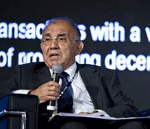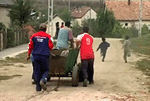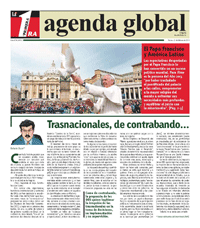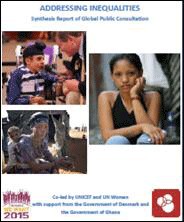News
|
Published on Tue, 2022-07-19 18:04
|
Published on Tue, 2015-09-01 11:32
As the dust settles on the recent July meetings in Geneva of the new UN Intergovernmental Working Group (IGWG) on transnational corporations and other business enterprises, which kicked off negotiations towards a treaty on this topic, there are some interesting developments to consider. These developments concern how the human rights narrative at the UN related to business activities might finally be shifting toward recognition and interaction with important traditional human rights principles.
Within human rights law and in the practice of human rights advocates, much is made of the primacy of human rights over all other legal obligations states have. In particular, article 53 of the Vienna Convention on the Law of Treaties, and various articles of the UN Charter, have created a solid international legal foundation for understanding this norm, although so far not much has been made of emphasizing the primacy of human rights in the context of the UN’s debate around ‘business and human rights.’
|
Published on Fri, 2014-06-27 09:53
A stand-alone goal on addressing inequality continues to see a serious divide between developing and developed countries.
Member States in the Open Working Group (OWG) on Sustainable Development Goals (SDGs) that met at its 12th session on 16-20 June in New York are negotiating a set of goals and targets based on a "zero draft" prepared by the OWG Co-Chairs Ambassadors Macharia Kamau (Kenya) and Csaba Korosi (Hungary).
They met in "informal-informals" mode on 9-11 June with intense work on the first seven proposed goals as the July deadline for the OWG's work draws closer and continued in this mode into the week that was originally scheduled to be in a formal mode.
|
Published on Fri, 2014-02-21 19:19
Popular story has it that a custom officer was obsessed with finding out what the old man was hiding, as he crossed the border every day with a donkey loaded with hay. Never able to discover anything unusual in the forage, one day he announces:
- I have just retired and I have no authority any more, but I will not die in peace if I do not get to know what your business really is.
- It's easy, -replies the old man- I smuggle donkeys.
|
Published on Fri, 2013-09-13 17:24

Photo: Ministry of Labor and
Social Security (Uruguay).
|
The open panel on "Progress and Challenges on Tax Justice and Social Justice in Uruguay", put together by Development Alternatives with Women for a New Era (DAWN), Center of Concern, Social Watch and the Association for Women's Rights in Development (AWID) - all members of the Righting Finance Initiative - together with the International Council for Adult Education (ICAE) took place on Friday, August 16, 2013.
Eduardo Brenta, Labour and Social Security Minister and Pablo Ferreri, Director of the Directorate-General for Taxation (DGI) discussed the impact of Uruguay tax and labor polices in terms of redistribution and the future challenges together with academics, feminist and human rights activists.
|
Published on Sun, 2013-07-14 00:00

Yilmaz Aykuz. (Photo: UN)
|
The United Nations’ Post-2015 Development Agenda should not simply extend MDGs, or reformulate the goals, but focus instead on global systemic reforms to remove main impediments to development and secure an accommodating international environment for sustainable development. This is a big, ambitious agenda which cannot be acted on overnight. An action plan for systemic reforms could be supplemented, but not substituted, by specific goals in some areas of economic and social development.
|
Published on Thu, 2013-06-06 00:00

Roma in Hungary. (Photo: OHCHR).
|
In Hungary a system has developed that is disrespectful to both the rule of law and constitutionalism. Hungary has turned against the democratic ideals of the world, civil liberties are restricted and today it is on a declining economic path. Political life is characterized by a murderous policy divergence, confrontation and a dangerous ideology-based polarization. The majority of the society is struggling with unjust and unequal relationships without even the hope offered by mutual solidarity. Hungary's international prestige, integrity and credibility are now at its lowest point.
|
Published on Wed, 2013-03-27 15:01
The scale of resource needs for the post-2015 and sustainable development agendas, although yet to be fully quantified, provides a serious challenge for aligning expectations of an ambitious post-2015 agenda with the implementation of that agenda. To bridge this gap, it is crucial that Africa, hitherto considered to be significantly dependent on external resources for financing its development, puts forward its vision of how the financing issue should be addressed.
|
Published on Wed, 2013-03-27 14:29
African thinkers, parliamentarians and civil society organisations who gathered in Midrand, South Africa, hosted by the Pan African Parliament, articulated what is emerging as a growing consensus in various fora taking place on the continent: ‘the building blocks of development’ have to be front and centre in the post-2015 discussions; and the imperative to underpin a developmental/structural transformation has to inform the approach taken to governance (developmental governance), financing and the global developmental partnerships, as well as the socio-economic development goals and targets.
|
Published on Thu, 2013-02-28 17:53
For over a decade the debate, research and practice focused on extreme poverty. However, the key to the new development agenda could be somewhere else, much less illuminated by the political debate: inequality. This is what emerges from several months of consultations with academics and civil society organizations performed by the specialized agencies of the United Nations on women and children, UN Women and UNICEF.
|

|












